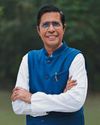
How has Brand Hamdard stayed relevant over the last 100 years?
It is because of our philosophy of providing quality products to the masses at an affordable price. We have always stayed true to that mission. That is one of our core focus areas, and we have been very successful. This has been proven with Rooh Afza, which is not only the highest selling, but also the most economical, sharbat in that category. It is also known for having the most number of ingredients in that category. Others use synthetic products. They use just sugar and colour. But we use ingredients such as mint, rose petals, orange juice, pineapple juice and cloves.
Our motive is also to earn profits, but how to use these profits is equally important. We provide the best quality of products at an affordable price. And, we use our profits differently. We give away 85% of the profits that we earn in charity. This is, again, a point of relevance.
We have been building institutions. We have built a university, a couple of schools, cultural institutes and skill development institutes from the profits that we have earned from selling Hamdard products all through these years. We have managed to stay relevant because of this model.
How has Hamdard's journey been so far?
Hamdard was started by my great-grandfather Hakeem Abdul Majeed in 1906 in old Delhi. It was a proprietorship company at that time. Unfortunately, he died in 1921. So, his wife, who was my great-grandmother, and her two sons (my grandfather and his younger brother) formed a partnership in the business.
This story is from the August 2023 edition of Outlook Business.
Start your 7-day Magzter GOLD free trial to access thousands of curated premium stories, and 9,000+ magazines and newspapers.
Already a subscriber ? Sign In
This story is from the August 2023 edition of Outlook Business.
Start your 7-day Magzter GOLD free trial to access thousands of curated premium stories, and 9,000+ magazines and newspapers.
Already a subscriber? Sign In

From Chandni Chowk to Global Recognition
For Manish Aggarwal, director at Bikano, Bikanervala Foods, the family business was not just a responsibility but a passion he took to the global stage

Spotting AI Scams
Al has become an integral part of our lives, from customer service no insurance claims. But it is also becoming a tool for fraudsters who use it to scam individuals and corporations

Let a Hundred Flowers Bloom
On the banks of the Ganges in industrial Kanpur, a start-up has blossomed that turns waste flowers into incense

BATTERY LOW
India produces enough green energy to power many of its largest cities yet lacks the storage to use it efficiently. A nation blazing forward must leap ahead in battery technology to stay on course

We Have Everything Going for Rajasthan
Rajyavardhan Singh Rathore, Rajasthan’s industry and commerce minister, tells Pushpita Dey why the state is suited to become a hub for investments.

Dairy and Other Dilemmas
India’s refusal to open its dairy market has complicated trade negotiations for years. As global partners demand concessions, is the cost of protectionism outweighing benefits?

Riding in a Maze
As gig workers ride into an uncertain future with little more than a smartphone and a bike, the government is struggling to arrange a socialsafety net. But millions without social security is recipe for disaster

BIRLA'S BIGGEST BATTLE
As Kumar Mangalam Birla completes 30 years at the helm of the Aditya Birla Group, he has a battle to defend his businesses and conquer new ones

THE INNOVATION LEAP
India dreams of becoming a product nation. But unless the corporate sector significantly increases spending on R&D, the country will continue to lag behind global peers

EDUCATION BUDGET MUST DOUBLE EVERY 3 YEARS
Veezhinathan Kamakoti, a renowned academic and director of Indian Institute of Technology Madras, tells Deepsekhar Choudhury on what technology sovereignty means for India and how it can propel the country towards its vision of becoming a developed nation by 2047.